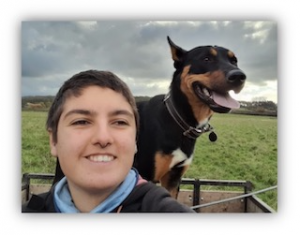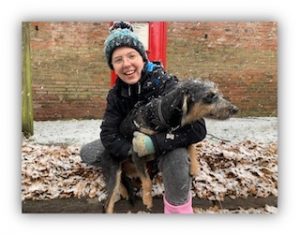
March 17, 2022, by Sean May
Being LGBTQIA+ on Placement
As part of our recent Sutton Bonington LGBTQIA+ History Month 2022 steered by Brad Hill (SVMS), we had two excellent talks from members of the Schools at SB. This blog is a modified version of some guidance and advice allied to those talks:
Common Concerns
Many students on SB who identify as part of the LGBTQIA+ community feel apprehensive about beginning university-related or independent work experience, especially if it’s in a rural setting, or if we come across as ‘visibly’ queer.
Concerns commonly include:
- Hosts or colleagues identifying us as queer due to our self expression, or else through our conversations, and treating us differently as a result.
- Being misgendered or feeling dysphoric in our presentations.
- Feeling pressured to keep our identities hidden or reduce their significance to us in order to “make life easier”.
- Hearing homophobic, transphobic or otherwise bigoted language, even if the target isn’t us personally.
There are many levels to our concerns, and they are each valid, though some more nuanced and harder to navigate than others.
The bottom line is, none of us should feel unsafe or invalidated by our experience in educational work placements.
LGBTQIA+ in Farming
Farming is typically a profession lacking in diversity, which extends to inclusion of the LGBTQIA+ community. Only 0.6% of LGBT people work in agriculture, quarrying and mining combined. This can make essential farm experiences (i.e. lambing, milking, harvests, hay making) a daunting prospect, especially with unfamiliar hosts.
Even in more progressive farms, equality and diversity is a real issue. Mariana works in regenerative agriculture, the on-farm team has them and 2 other men, the office has 3 women, and the wider team also has many women, though mostly white. Before Mariana began working there, conversation around diversity seems to have been limited.
Agrespect aims to give a platform to LGBTQ+ people in rural communities, and is worth checking out on social media and to see stories of people living openly and happily whilst working within farming.
LGBTQIA+ in veterinary practice
Whilst the veterinary practice is also a profession lacking in ethnic and socioeconomic diversity, 10.6% of respondents in a 2019 survey of the veterinary profession identified with labels other than heterosexual/straight; this is higher than the national average.
However, it can still be daunting to go to a new placement, whether AHEMS or CEMS, especially if you have never been to the host before, as it is tricky to predict workplace culture.
BVLGBT+ is an organisation that supports, educates and informs the veterinary profession about LGBTQ+ issues, and that you can join for free as a student. They run regular events and financially support students to attend, so are worth checking out.
Introducing pronouns
If you’re trans and feel comfortable, introducing your pronouns can be helpful to clarify expectations with your host.
Some things to bear in mind:
- Introducing pronouns can entail some education from you i.e. what it means to be trans/non-binary/intersex. While it’s not your responsibility to educate (at all), it might be necessary to help your host understand.
- Manage expectations; pronouns aren’t always respected and it can be exhausting for you to continuously correct people.
- Some LGBTQIA+ people feel that it is easier to not start that conversation and just ‘grin and bear it’; such “cost/benefit” weighing up is unfortunately a familiar experience for many queer people.
- If you get the impression people are going to discriminate or not respect what you have told them, you may wish not to share that information for your own safety and so you can focus on learning from the placement.
Some ways to introduce your pronouns include:
- Consider including your pronouns in your CV and covering letters when applying to placements, if you have to send such documents.
- Add your pronouns to your email signature, so that in communication with placement hosts ahead of time, they’ll probably see them and have time to process the information.
- On the first day of placement, if you feel comfortable, mention your pronouns to your colleagues in your introduction.
- If you prefer a more casual approach, you could wait until someone talks about you in third person, and then hop in and correct them (if they misgender you)- you can simply say “Oh, by the way, I use [insert pronouns]- thanks!”
Managing micro-aggressions
Microaggressions are frustrating to navigate; many people don’t realise the implications of their language or behaviour, and confronting these actions can cause you to be wrongly labelled as hyper-sensitive (which is, in itself, a microaggression).
Examples of commonly experienced microaggressions include:
- Hearing derogatory ‘in-jokes’ between other colleagues, that may be based on stereotypes or slurs.
- Being told that you “don’t look gay”, or similar comments.
- Being assigned jobs based on gender/appearance as opposed to ability e.g. feminine-presenting people told to feed pet lambs, masculine-people to catch ewes.
- Being asked intrusive questions about your sexuality or gender identity.
Unfortunately, this kind of behaviour is still quite common, especially on some farms. Sometimes countering discriminatory remarks with inclusive language (i.e. queer people, POC, AFAB) makes people realise the exclusionary nature of their comments. Or, showing an interest in learning a skill from a host will convince them to teach you what they may consider a “gendered” task.
Managing expectations
Factors such as location of the placement (is it somewhere rural or urban?) and length of time spent there (is it a month or just 3 days?) can affect the ‘cost/benefit’ of sharing certain information to hosts and peers. Consider the following:
Q: Are you in a location where there’s plenty of LGBTQIA+ representation?
In areas with more representation, you are less likely to be the first queer person your colleagues have met, and more likely to be surrounded by people who already understand different gender identities and sexualities.
Q: Do you feel sharing this information will positively impact your experience? E.g. Will people take on your name/pronouns?
It may be useful before your placement starts to think about a contingency plan in case your colleagues do not react as they should; ensuring you have a support network around you outside of placement is key (more on that below).
It can be really painful to accept that you may be misgendered, or to hide your gender or sexuality, for the length of your placement, but you are no less valid in your gender, gender expression or sexuality if this occurs.
Q: If you chose not to share your sexuality or gender identity, will this negatively impact your mental health and therefore, your learning experience?
Some people find that others assuming they are cis-het actually makes them more uncomfortable than being open about their identity. This doesn’t apply to everyone but it’s important to consider how this can impact your mental health- it’s natural to feel some anxiety around your personal identity being presumed.
There’s no correct answer to any of the above- as in all situations, how public you are about your gender and sexuality is a highly personal situation and no two LGBTQIA+ people have the same experience, so take into account your own personal circumstances. It can be useful to consider the following question:
Does the positive impact of sharing your LGBT+ identity outweigh the potential costs of explaining it on this particular placement?
Getting support
It’s completely understandable to need more support on any placement, especially if you’re struggling with feelings of invalidity for your identity.
Often, we have readymade support networks in place, in the form of friends or family, and it’s always useful to reach out and talk about what you’re feeling, whether it’s good or bad- or to distract yourself from placement by talking about something completely different!
If you feel you need to alert the university to problems on your placement, both the Veterinary and Bioscience Schools have routes to access help. Importantly, you always have the right to walk away- you don’t have to stay on a placement where you feel uncomfortable or unsafe.
If you ever do feel discriminated against on your placement, it’s important to let your tutor/placement organiser know – not just for you, but so that future students don’t visit the same place and feel unsafe.
Confidential support can be found at ReportAndSupport, and there is lots of relevant guidance at University Well-being Support. Support and Wellbeing officers can also direct you to the right service, and can be contacted at ss-sup-medhealthsci@nottingham.ac.uk.
Vet School: Email the placements office at veterinary-placement@nottingham.ac.uk and your personal/senior tutor; if you feel you are experiencing harassment, there is a guidance document on Moodle in the Placements section about how to proceed, and a Report Form.
Biosciences: Email Dr. Judith Wayte, Rachel Jessop or Hannah Corbett from the placement team with any problems as well as your personal tutor.
Personal Experiences
We thought we’d compare our personal experiences to show that although two people can have quite similar lived experiences, they can still have completely different approaches to sharing their identities!
 Mariana McCormick, Animal Science, they/them
Mariana McCormick, Animal Science, they/them
The first time I formally addressed my pronouns at work experience was when I started my year in industry placement in 2021. I took this step for two reasons; firstly, I had recently become a lot more self-assured in my trans identity. This new confidence empowered me to take action on how people addressed me in my work space. Secondly, the idea of ‘with-holding’ or ‘toning down’ my LGBT+ self for an entire 10 months made me extremely uncomfortable – I personally find great validation in being open about myself.
Not everyone has the same experience in disclosing their identity and if you chose not to, you are no less valid. By this point I already knew my work mates fairly well and could assess how they would react to me.
 Phoebe Little, Veterinary Medicine, they/them
Phoebe Little, Veterinary Medicine, they/them
Moving forward, I am still unsure as to how I will approach short-term placements. But I feel confident knowing that the decision to share my experience of sexuality and gender is mine alone.
I never felt that my sexuality caused any issues on AHEMS placements. I have not been on a CEMS placement since coming out as non-binary, but currently I plan on keeping my pronouns private.
This is because the idea of addressing my gender identity on placement causes me more stress than the idea of being misgendered- but this obviously could change! I do struggle with feeling like a “worse” trans person because of this; although obviously this is not true, I thought it’s worth sharing that I feel like this as I know I’m not the only one in this situation, and I hope it’ll help people to know that they’re not the only ones feeling like that.
Ultimately, I think finding what works for you personally is important, and understanding that nothing is set in stone- you can change your mind!
Sorry, comments are closed!
